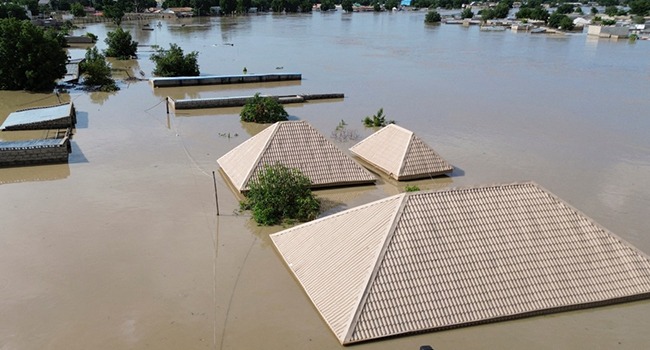‘Act Now’, Says World Bank As Flood Displaces 404 Million Students From School Globally
 The World Bank has called on governments of countries affected by severe flooding, to take immediate steps to forestall future occurrences as no fewer than 404 million students globally have been unable to access their schools due to climate-related issues, including floods between January 2022 and June 2024.
The World Bank has called on governments of countries affected by severe flooding, to take immediate steps to forestall future occurrences as no fewer than 404 million students globally have been unable to access their schools due to climate-related issues, including floods between January 2022 and June 2024.
A report by the World Bank titled “Choosing Our Future: Education for Climate Action,” connected the huge statistics to at least 81 countries, including Nigeria temporarily shutting down schools due to floods, storms, and heatwaves.
According to the World Bank, climate change, including floods, is causing significant school closures, adding that the disruptions remained largely invisible because relevant authorities are not tracking them.
The report comes as Nigeria currently battles high-levelled flooding due to incessant rainfalls which had sacked residents from their homes and communities, with the latest and most touching reports coming from Maiduguri, the capital of Borno State. The overflow of the Alau Dam caused the Maiduguri flooding, and displaced nearly two million people in Maiduguri and surrounding areas.
The report stated, “Education can propel climate action but at the same time, climate change is impeding education.
“Climate change is increasing the frequency and intensity of extreme weather events such as cyclones, floods, droughts, heatwaves, and wildfires, as well as the probability of co-occurring events. These extreme weather events are increasingly disrupting schooling and precipitating learning losses and dropouts.
“Climate change is causing massive school closures. These disruptions remain invisible because they are not being tracked. There is no official data on the frequency and severity of school closures due to extreme climate events. Consequently, this crisis is going largely unnoticed.
“Novel analysis for this report shows that over the past 20 years, schools were closed in at least 75 per cent of the climate-related extreme weather events impacting five million people or more.
“Most worryingly, the frequency and severity of school closures continue to grow due to climate change.
“Between January 2022 and June 2024, an estimated 404 million students faced school closures due to extreme weather events.
“This was the result of at least 81 countries shutting down schools temporarily due to floods, storms, and heatwaves.”
The report also mentioned that for less than $20 per student, schools can adapt and minimise learning losses.
“Climate-related school closures mean students are losing days of learning. Even when schools are open, students are losing learning due to rising temperatures.
“Governments can take steps to harness education and learning for climate action by, for example, improving foundational and STEM skills, mainstreaming climate education, and building teacher capacity. Governments can also prioritize green skills and innovation in tertiary education to help accelerate the shift to more sustainable practices.
“Despite their prevalence, climate-related school closures remain invisible because no one is tracking them.
“Education systems can empower, equip, and skill young people for climate mitigation and adaptation. At the same time, climate change-induced heat and extreme weather events are significantly disrupting learning, with low-income countries being disproportionately affected. Governments must act now to adapt education systems for climate change.
“Education is a key asset for climate action. Education reshapes behaviours, develops skills, and spurs innovation—everything needed to combat the greatest crisis facing humanity.
“Better educated people are more resilient and adaptable, better equipped to create and work in green jobs, and critical to driving solutions.
“Yet, education is massively overlooked in the climate agenda. Almost no climate finance goes to education. Channelling more climate funding to education could significantly boost climate change mitigation and adaptation.
“At the same time, climate change is a huge threat to education. Millions of young people face lost days of learning because of climate-related events. In low-income countries, the situation is worse. Unless made up, this lost learning will negatively impact future earnings and productivity. It will also lead to greater inequality both within and across countries.
“The economic losses and human cost of climate change are enormous. Despite this, climate action remains slow due to information gaps, skills gaps, and knowledge gaps. Education is the key to addressing these gaps and driving climate action around the world. Indeed, education is the greatest predictor of climate-friendly behaviour. Better educated people are more resilient and critical to spurring innovation and climate solutions,” the report said.
Importance Of Climate Awareness
The report also emphasised the importance of education for climate awareness, noting that an additional year of education increases climate awareness by 8.6 per cent.
“Education can empower young people with green skills for new jobs but also augment skills for existing jobs. Education is massively overlooked in climate financing, and climate change is threatening education outcomes.
The report added that the green skills needed by policymakers and students are broad, including technical, STEM, and sector-specific skills, as well as non-technical, socio-emotional, and cross-sectoral skills. Any job and any sector can become greener with the right set of skills. These skills are not just for ‘new’ jobs but also for the augmentation of existing jobs. The demand for these skills can be unpredictable and inequitable,” the report stated.
It added, “Countries lost on average 11 days of instruction per year (or 6 per cent of an academic year) in affected schools due to climate-related school closures. But impacts were highly unequal – low-income countries lost about 18 days per year (or 10 per cent of an academic year) in affected schools, while high-income countries lost only 2.4 days.
“Unless made up, this lost schooling will translate into big learning deficits for children in low-income countries. For instance, it takes about 18 days to teach a student how to add two-digit numbers to one- or two-digit numbers, with carrying (assuming well-designed and structured pedagogy)
“Even when schools are open, students are losing learning due to climate change. An average student in the poorest 50 per cent of Brazilian municipalities could lose up to 0.5 years of learning overall due to rising temperatures.
Immediate Action Required
It advised governments of affected countries to act immediately.
“Governments can act now to adapt schools for climate change in cost-effective ways. A low-cost adaptation package for education systems would cost around US$18.51 per student. More effective but expensive adaptation packages would cost between US$45.68 – US$101.97 per student.
“All these adaptation packages include solutions for temperature control, infrastructure resilience, remote learning during school closures, and teacher training. The first two components will help reduce the likelihood of climate-related school closures and all four components will help minimise climate-related learning losses. Costs would be lower for systems that already have some elements in place. For reference, low-income countries spend an average to US$51.80 per student per year, while high-income countries spend US$8,400 per student per year.”
This is as the National Bureau of Statistics (NBS) recently reported that students in some parts of Nigeria missed 53 school days due to flooding. The NBS report titled “Nigeria Flood Impact Recovery Mitigation Assessment Report 2022-2023,” indicated that approximately 1.3 million Nigerians were affected by flooding between July and October 2022.
The report listed severely affected states such as Bayelsa, Delta, Anambra, Kogi, Nasarawa, and Jigawa, among others.













